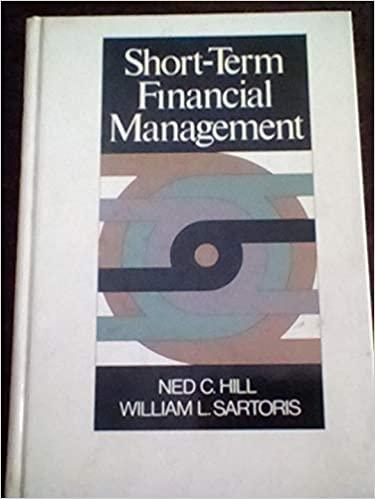Question
9.6 Your marketing department estimates that Medicare urology visits equal 5 (1.0 C ) + (6.5 T O ) + (5 T R ) +
9.6 Your marketing department estimates that Medicare urology visits equal 5 (1.0 C ) + (6.5 T O ) + (5 T R ) + (0.01 Y ). Here, C denotes the Medicare copayment (now $20), T O is waiting time in your clinic (now 30 minutes), T R is waiting time in your competitors clinic (now 40 minutes), and Y is per capita income (now $40,000). a. How many visits do you anticipate? b. Medicares allowed fee is $120. What revenue do you anticipate? c. What might change your forecast of visits and revenue?
9.7 Because of fluctuations in insurance coverage, the average price paid out of pocket ( P ) by patients of an urgent care center varied, as the table shows. The number of visits per month ( Q ) also varied, and an analyst believes the two are related. The analyst also thinks the data show a trend. Run a regression of Q on P and Period to test these hypotheses. Then use the estimated parameters a , b , and c and the values of Month and P to predict Q (number of visits). The prediction equation is Q = a + ( b Month ) + ( c P ).
| month | 1 | 2 | 3 | 4 | 5 | 6 | 7 | 8 | 9 | 10 | 11 | 12 |
| P | 21 | 18 | 15 | 24 | 18 | 21 | 18 | 15 | 20 | 19 | 24 | 20 |
| Q | 193 | 197 | 256 | 179 | 231 | 214 | 247 | 273 | 223 | 225 | 198 | 211 |
Use the data in Exercise 9.7 to answer these questions: a. Calculate the nave estimator, which is Q t = Q t 1 . b. Calculate the two-period moving-average forecast. c. Calculate the mean absolute deviation for the regression forecast, the nave forecast, and the two-period moving-average forecast. d. Which forecast seems to perform the best? Why?
Step by Step Solution
There are 3 Steps involved in it
Step: 1

Get Instant Access to Expert-Tailored Solutions
See step-by-step solutions with expert insights and AI powered tools for academic success
Step: 2

Step: 3

Ace Your Homework with AI
Get the answers you need in no time with our AI-driven, step-by-step assistance
Get Started


